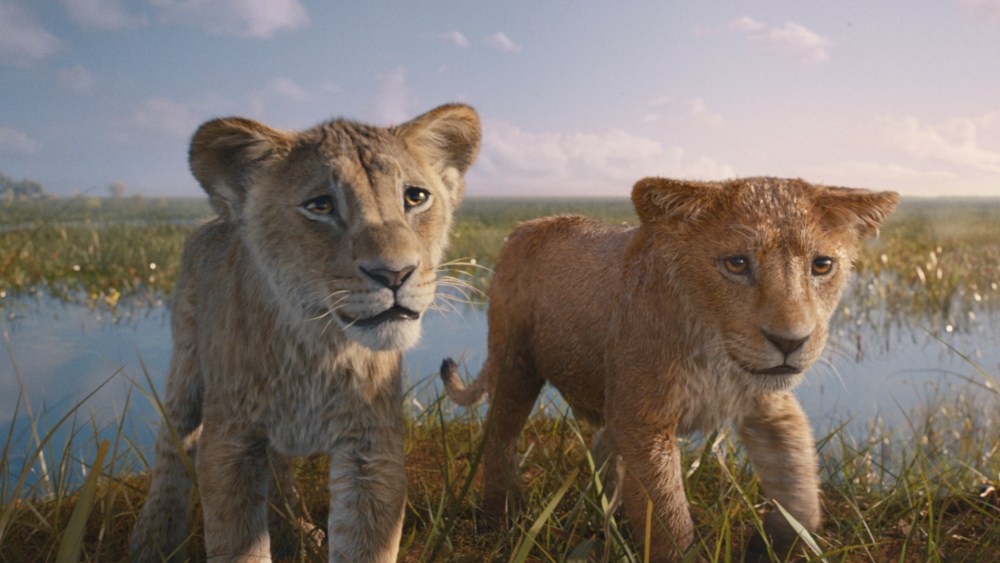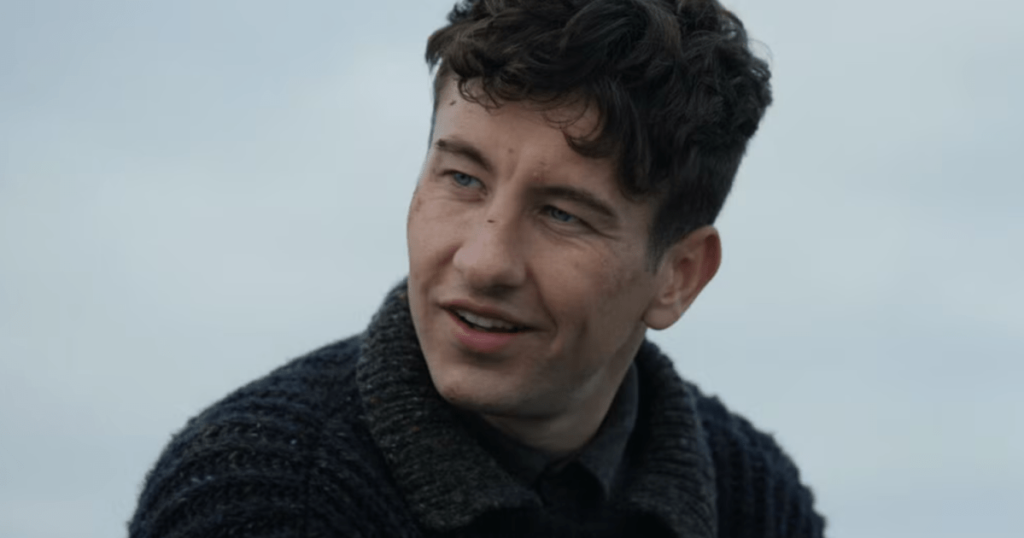SPOILER WARNING: This story discusses minor plot details for “Mufasa: The Lion King,” now in theaters.
Lin-Manuel Miranda and composer Dave Metzger both knew the mighty musical legacy they had to uphold when writing the music for Disney’s “Mufasa: The Lion King.”
The “Lion King” prequel tells the story of young Mufasa, voiced by Aaron Pierre, and his adopted brother Taka, who will be known as Scar (voiced by Kelvin Harrison Jr.). In writing original songs and composing new music, Miranda and Metzger looked at how they could honor the tracks written by Elton John and Tim Rice, as well as Hans Zimmer’s score from the original animated film. Under the direction of Barry Jenkins, they also aimed to inject new music and give the prequel its own distinct sound.
South African musician Lebo M, whose chants and voice have been integral to the “Lion King” universe, returned to maintain that consistent thread, while Miranda drew inspiration from the ’90s R&B band Jodeci in writing the film’s love song.
Here, Metzger and Miranda discuss with Variety navigating the balancing act and reveal the secret to writing music that will live forever in the Disney canon.
When you come into this world, you have to honor the legacy that came before you, but you also get to put this fresh air of music into the film. So, where does that begin for each of you?
DAVE METZGER: Hans Zimmer’s score was just iconic, so you have to acknowledge that. It wouldn’t be fair to the film if I hadn’t gone there. But the toughest part was trying to figure out how much of the original score to use to make sure that everybody knew that we were in this world.
However, when talking with Barry Jenkins, he wanted this to have its voice and identity. So, it was about coming up with themes.
In the case of Rafiki, I came up with a new theme for him that hadn’t existed before. I gave him a voice he hadn’t had in the original film.
I’ve also got to be using Lin’s themes in the score, because you’re doing a disservice if you don’t do that — not only to the audience but to the film itself. So, it’s a matter of looking at where best to utilize those. A great example is “I’ve Always Wanted a Brother.” I was able to change that throughout the film and add another level of depth to their character and relationship.
LIN-MANUEL MIRANDA: One of my favorite discoveries in writing this music was finding that “I’ve Always Wanted a Brother” theme because it is this joy as we get to know Mufasa and Taka, but then Taka takes a turn, and that theme comes back in a really mournful way. The notes don’t change, but the context does, and Dave grabbed that ball and ran with it.
Lebo M returns for the soundtrack. How integral was he to your work and finding the music of “Mufasa”?
MIRANDA: If there is a connective tissue across “The Lion King,” it is Lebo M. It is the African rhythms, harmonies and the singular voice that he brings to it. It’s the first voice we hear in the original film. His work with you, Dave and Mark Mancina on the Broadway soundtrack is what expanded, I think, the musical palette of what “The Lion King” could be for Broadway, and is one of the reasons it’s one of the longest-running shows on Broadway and all over the world. So, to me, he’s synonymous with it.
It was really fun to work with him. And I think he was very excited to work on new songs because he’s been the caretaker of these incredible Elton John and Tim Rice songs across the different ways they’ve manifested, and I was just very deliberate about making space for his work.
In the song “Milele,” I knew he was going to come in with beautiful choral counterparts to it. And he did. He writes with his voice, and it’s incredible to watch. He listens to the track, he internalizes and goes to the mic and then he harmonizes with himself. It was fun to be witness to that and then witness him translating that to his choir a year later when we recorded the soundtrack. That was part of the reason I said yes, was to get to be in the room while that creation was happening.
METZGER: Lebo has been a brother for 30 years for me. He is the voice of “The Lion King.”
At the end of the film, Mufasa and Kiara (Blue Ivy Carter) roar, and it switches into an African choral element with Lebo singing. I had written my theme for Kiara, and the night before, I thought it would be great to have Lebo doing something on it. So the next morning, we were in the studio with the choir. He listened to my theme and my music, and he sat there in the control room, absorbing it. He runs out to the studio, and this choir is out there just waiting. And then he starts singing a line, he points at a group of singers, and then they start singing, and all of a sudden you’ve got this amazing creation. So Lebo is just like a miracle.
I love a good Disney love song, and “Tell Me It’s You” is perfect. What was your way into writing that?
MIRANDA: It begins with Jeff Nathanson’s script. That moment in the screenplay was about how so much loss had conditioned Mufasa, and he has this fount of humility and modesty. Sarabi tells him, “You are capable of so much more, I see the greatness in you.” Slowly, he has all these feelings for her, but he doesn’t feel like he has the right to have them. Which, man, how relatable is that?
I think we all go through a version of that. It was also hinted at in the line of dialogue, “Tell me it’s you.” It’s OK to say it, and once they say it, they can’t stop saying it. So the fun discovery inside the song is [the lyric], “Say it again,” and when you’re in those first full throes of young love, you want to tell the world, and you want to not ever stop being in it and saying and hearing someone say it back to you.
And Barry’s location — those ice caverns gave us everything, they use a chance to fuck with reverb. The kind of K-Ci and JoJo and Jodeic, that’s what I was pulling on — my young love, gooey center. Those are the energies I’m calling on when writing that tune.
Speaking of Barry, what was it like collaborating with him and having to deliver music to him?
METZGER: Barry is a genuinely great person. I felt like he led me to places I wouldn’t have naturally gone to. In the underwater fight near the end, my first take was quite different than what ended up in the film. But he challenged me, in a positive way, to go a little deeper and do something else that wasn’t the natural way I would have written it. And it helped me grow as a musician and as a composer.
MIRANDA: I said yes to this gig because I wanted to work with Barry Jenkins and learn from him. Dave, what you said about him pushing you beyond what you know how to do. I remember sending Barry the first verse and chorus of, “I Always Wanted a Brother.” I said, “I think this is the vibe. Am I on the right track? Am I on the wrong track?” He sent me back this incredibly long, thoughtful email, and he said, “I wonder if you can get this in?”
We had a conversation where Mufasa and Taka are talking about the birds and Taka says, “I’m in charge of them, too,” and Mufasa tells him, “No one is in charge of the birds.” That became the fuel for the second verse of the song. I find that verse almost the most poignant because it points to entitlement versus nurture. In terms of what Taka believes the world owes him versus what Mufasa sees as his place in the circle of life. It’s this very organic conversation of these birds while these two brothers are climbing a tree, and it takes on even greater resonance the second time you watch the movie.
Barry, by virtue of, “What about this?” He got us to that place. The iterative process of working with Barry just allows you to add layers. But sometimes these songs don’t always get the luxury of having.
What is the secret to writing songs and music for the Disney canon that are going to be immortalized forever?
MIRANDA: Refine your first draft. This thing has got to stand up. You’ve got to be able to tolerate this song. It can’t just be like you want to honor that first impulse. But it’s also this thing that might be coming out of a toy or played at a fireworks display. You’ve got to like it before you even send it. For me, It’s just an increased kicking of the tires of it. I make sure my kids really like it. I’d make sure my wife really likes it.
METZGER: You want to just make sure that you really get it as well as you can. I always have my wife come in before I send off any cues. She’s my governor on the whole deal as far as making sure that I haven’t missed something, or that it’s as strong as it can be.
This interview has been edited and condensed for clarity.


